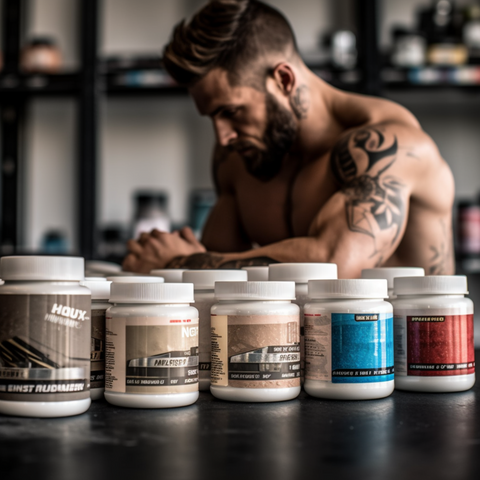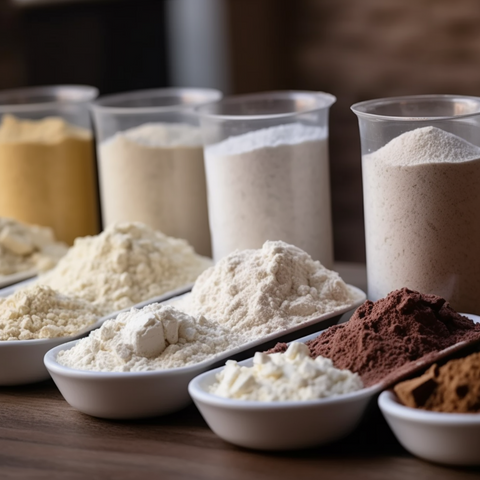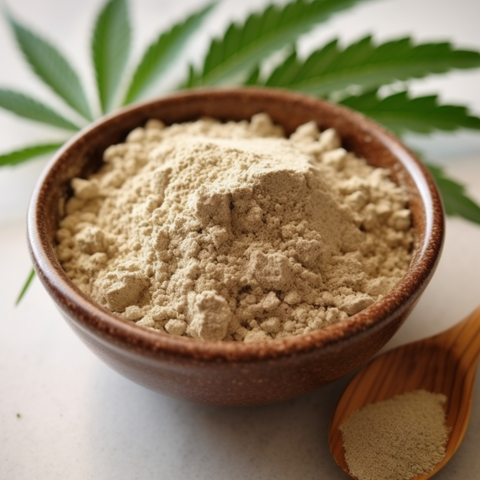Protein & Cannabis: The Future of Muscle Gain Supplements

Protein is a cornerstone for muscle development and recovery in fitness and bodybuilding. The significance of protein in muscle gain cannot be overstated. As the primary building block of muscle tissue, protein plays a pivotal role in repairing the microtears during strenuous workouts, facilitating muscle growth and strength.
Muscle growth, or hypertrophy, results from a positive balance between muscle protein synthesis and muscle protein breakdown.
When we exercise, especially in resistance training, muscle fibres experience wear and tear. The dietary protein, broken down into amino acids, aids in repairing and building these fibres, leading to muscle growth. Thus, maintaining an adequate protein intake becomes paramount for those aiming to gain muscle mass.
The Role of Protein Powders in Supplementing Dietary Protein
While whole foods are the ideal protein sources, our modern lifestyles often make consuming enough protein solely from our diet challenging. This is where protein powders come into play. These supplements offer a convenient, efficient, and often cost-effective way to meet our daily protein requirements. Whether it's whey, casein, soy, or plant-based options like pea and hemp, protein powders can seamlessly integrate into our diets, supporting our muscle-building endeavours and complementing our nutritional intake.
Why Protein is Essential for Muscle Gain
Protein, often called the 'building block of life', is paramount in muscle development. Its role extends beyond just being a dietary component; it's the foundation upon which our muscles rebuild, repair, and grow.
Role of Protein in Muscle Repair and Growth
Every time we engage in physical activity, especially resistance training, our muscle fibres undergo microscopic damage. While sounding negative, this damage is a crucial part of the muscle-building process. It's protein that steps in post-exercise, providing the essential amino acids required to repair these damaged fibres. As these fibres heal, they become thicker and more robust, leading to muscle growth. This repair process would only be improved with adequate protein, stalling muscle development and potentially leading to muscle wastage.
The Science Behind Muscle Protein Synthesis
Muscle protein synthesis (MPS) is the scientific term for building new muscle proteins. When we consume protein, it's broken down into amino acids, which are then used as the building blocks for MPS. The balance between MPS and muscle protein breakdown determines muscle growth.
Post-exercise, MPS rates spike, especially when complemented with protein consumption, creating an anabolic or muscle-building state. Understanding and harnessing this intricate dance of breakdown and synthesis is vital to optimising muscle gains.
Top 10 Protein Powders for Muscle Gain

In the ever-evolving realm of fitness, protein powders have firmly established themselves as a quintessential tool for those dedicated to muscle gain. With an overwhelming array of choices, each touting its unique advantages, discerning the best can be a formidable challenge.
We've delved deep, amalgamating insights from user experiences, expert opinions, and rigorous scientific evaluations to demystify this. Here's our meticulously curated list of the top 10 protein powders to amplify your muscle-building endeavours.
1. Crazy Nutrition Tri-Protein
Overview: Setting itself apart, Crazy Nutrition Tri-Protein is revered for its avant-garde blend of three protein types, each tailored to specific metabolic phases.
- Features: A synergistic fusion of whey for swift absorption, casein for prolonged release, and soy for its comprehensive health benefits.
- Benefits: Guarantees a sustained amino acid influx to muscles, bolstering immediate post-exertion recovery and extended muscle sustenance.
2. XWERKS Grow
Overview: XWERKS Grow is where exceptional taste meets unparalleled quality, proving that flavour and functionality can coexist.
- Features: Elite-grade whey protein isolate derived from pasture-raised cows, epitomising purity and efficacy.
- Benefits: Its streamlined composition is a boon for those eyeing muscle sculpting without the extraneous bulk.
3. Transparent Labs Grass-Fed Whey Protein Isolate
Overview: Transparent Labs, living up to its moniker, is the gold standard in transparency, presenting a pristine protein source that resonates with fitness enthusiasts.
- Features: Procured from pasture-fed bovines, this protein is untouched by GMOs, hormones, or redundant additives.
- Benefits: Its abundant protein payload per serve is a catalyst for optimal muscle protein synthesis, driving efficient muscle augmentation.
4. Legion Whey+
Overview: Legion Whey+ is the epitome of unadulterated protein excellence, delivering pure protein without any extra components.
- Features: A lactose-averse formulation that's calorie-conscious and free from redundant fillers.
- Benefits: It's a godsend for those with lactose intolerance, facilitating muscle augmentation sans digestive distress.
5. Jacked Factory Authentic Iso
Overview: Jacked Factory Authentic Iso, though nascent, has swiftly ascended the ranks, becoming a darling among fitness neophytes.
- Features: Anchored around unblemished whey protein isolate, it promises an unparalleled protein rendezvous.
- Benefits: Its rapid assimilation ensures muscles are promptly nourished post-exertion, expediting the recuperation trajectory.
6. Myprotein Impact Whey Protein
Overview: A global behemoth, Myprotein is cherished not solely for its stellar quality but also for its eclectic flavour spectrum.
- Features: Flaunting an array of over 20 palates and sourced from pasture-fed cattle, it's a harmonious meld of gustatory delight and nutrition.
- Benefits: Its amino acid equilibrium facilitates muscle accretion and fat reduction, rendering it a multifaceted choice for fitness zealots.
7. Kaged Re-Kaged
Overview: For those pursuing that extra edge, Kaged Re-Kaged delivers protein with an added zing, courtesy of its infused creatine.
- Features: A distinctive concoction of whey protein isolate synergised with creatine.
- Benefits: The protein fortifies muscle recovery, while the creatine amplifies workout vigour, making it a dual-pronged dynamo.
8. Orgain Organic Protein
Overview: Tailored for the green brigade, Orgain proffers a robust plant-derived protein substitute without compromising muscle-building potency.
- Features: A congruous amalgamation of pea, brown rice, and chia seed proteins.
- Benefits: Being vegan-friendly and devoid of synthetic additives, it's the go-to for those championing organic muscle enhancement.
9. Onnit Plant-Based Protein
Overview: Onnit's botanical concoction challenges the norm, proving that vegetal proteins can match, if not surpass, their carnivorous counterparts in muscle-building prowess.
- Features: A robust blend encompassing pea, pumpkin seed, and sunflower seed proteins.
- Benefits: Its superior digestibility and rich amino acid tableau position it as a formidable contender for muscle accretion.
10. Gold Standard 100% Whey
Overview: A veritable colossus in the protein universe, Gold Standard has been the touchstone of quality for eons.
- Features: A composite of whey protein isolates synergised with whey protein concentrate.
- Benefits: Endorsed by global professionals, its nuanced amino acid composition ensures comprehensive muscle development.
The Role of Amino Acids in Muscle Gain
Amino acids, often dubbed the 'building blocks of life,' play a pivotal role in the intricate process of muscle gain. Their significance transcends mere muscle repair, delving deep into muscle protein synthesis and overall bodily functions.
Importance of Essential and Non-Essential Amino Acids
Both essential and non-essential amino acids have distinct roles in muscle development. Our bodies cannot produce essential amino acids independently, and must be sourced from our diet. They're crucial for repairing muscle tissue post-exertion. On the other hand, non-essential amino acids, though produced by our bodies, bolster this process, ensuring muscles recover and grow efficiently.
Contribution to Muscle Protein Synthesis
Muscle protein synthesis is the bedrock of muscle growth. Amino acids facilitate this process by replenishing the muscle fibres damaged during workouts. This not only aids in muscle repair but also promotes the growth of new muscle tissue, ensuring holistic muscle development.
Understanding amino acids' nuanced roles can significantly enhance one's muscle-building journey, making it more effective and sustainable.
Natural vs. Synthetic Protein Powders

The debate between natural and synthetic variants is evergreen in the vast realm of protein powders. Both have unique attributes, but understanding their differences can guide one towards a more informed choice.
Differences in Sourcing and Processing
Natural protein powders are derived directly from whole food sources such as peas, hemp, or dairy. Their processing is minimal, often involving simple extraction, filtration, or drying. On the other hand, synthetic protein powders are manufactured using artificial methods, often involving chemical additives or isolating amino acids in labs.
Benefits and Drawbacks of Each
Natural protein powders boast a cleaner label, free from artificial additives, and often retain more of the original nutrients from their source. However, they might have a shorter shelf life and can be pricier. Synthetic variants are usually more affordable and have a consistent amino acid profile, but they might contain artificial preservatives, flavours, or sweeteners, which some users prefer to avoid.
The Rise of Hemp Protein

In recent years, the health and fitness community has witnessed a burgeoning interest in alternative protein sources, with hemp protein emerging as a frontrunner. This shift is not merely a trend but a testament to hemp's multifaceted benefits.
Introduction to Hemp as a Protein Source
Hemp, a member of the Cannabis sativa plant family, has been cultivated for millennia for its fibres and seeds. Only recently has its prowess as a protein source been fully recognised. Hemp seeds are processed to produce hemp protein powder, offering a plant-based protein alternative that's gaining traction rapidly.
Benefits of Hemp Protein for Muscle Gain
Hemp protein is complete, boasting all nine essential amino acids vital for muscle repair and growth. Additionally, it's rich in omega-3 and omega-6 fatty acids, which can aid in reducing inflammation post-workout. Its high fibre content also promotes digestive health, ensuring optimal nutrient absorption.
Comparison with Other Protein Sources
While whey and soy proteins have dominated the market, hemp stands out for its digestibility and absence of allergens. Unlike soy, hemp is free from phytoestrogens, and compared to whey, it's plant-based, making it suitable for vegans and those with dairy sensitivities.
Cannabis and Muscle Recovery
The intersection of cannabis and fitness is a burgeoning area of interest, with many athletes and fitness enthusiasts exploring the potential benefits of cannabis, particularly in the realm of muscle recovery.
Role of CBD in Reducing Inflammation and Muscle Soreness
CBD (Cannabidiol), a non-psychoactive compound in cannabis, has garnered attention for its anti-inflammatory properties. CBD may help alleviate muscle soreness and reduce inflammation, making it a potential post-workout supplement. By mitigating these symptoms, CBD can expedite muscle recovery, allowing individuals to return to their training regimen more swiftly.
Effects of THC on Sleep Patterns and Muscle Recovery
THC (Tetrahydrocannabinol), the psychoactive component of cannabis, has been linked to improved sleep quality. As sleep is a crucial phase for muscle repair and growth, enhanced sleep patterns facilitated by THC can indirectly aid muscle recovery. However, it's essential to approach THC cautiously due to its psychoactive effects.
Benefits and Drawbacks of Using Cannabis Post-Workout
While cannabis offers potential benefits like reduced inflammation and improved sleep, it has drawbacks. Over-reliance can lead to tolerance, and there are potential legal and health implications to consider. It's crucial to consult with healthcare professionals and be informed about local regulations.
Safety and Dosage Considerations
Navigating the world of supplements, especially when combining them with substances like cannabis, requires a keen understanding of safety and dosage.
Recommended Protein Intake for Muscle Gain
For optimal muscle gain, it's generally recommended that individuals consume between 1.2 to 2.2 grams of protein per kilogram of body weight daily. This range can vary based on age, activity level, and specific fitness goals.
Side Effects of Overconsumption
Excessive protein intake can lead to potential side effects, including kidney strain, digestive issues, and nutrient imbalances. It's crucial to strike a balance to reap the benefits without compromising health.
Interactions between Protein Supplements and Cannabis
While research is still in its infancy, some evidence suggests that cannabis might affect protein synthesis. Combining protein supplements with cannabis should be approached cautiously, and it's advisable to consult with a healthcare professional to ensure safe and effective use.
While supplements offer myriad benefits, it's paramount to use them judiciously, keeping safety and recommended dosages at the forefront.
Vegan and Plant-Based Protein Options
The surge in veganism and plant-based diets has ushered in a new era of protein sources, offering alternatives to traditional animal-derived options.
Benefits of Plant-Based Proteins
Plant-based proteins derived from peas, hemp, and brown rice are lauded for sustainability and eco-friendliness. They often come with added benefits such as fibre, antioxidants, and a lower fat content. Moreover, they're free from hormones and antibiotics, commonly found in some animal products, making them a cleaner choice for many.
Comparison with Animal-Based Proteins
While animal-based proteins, like whey and casein, have been the traditional go-to for muscle gain due to their complete amino acid profiles, advancements in processing mean many plant-based proteins now also offer a comprehensive amino acid range. However, some plant proteins might require pairing with other sources to obtain all essential amino acids.
In conclusion, plant-based proteins present a viable, sustainable, and often healthier alternative to traditional animal-derived options, catering to a broader audience with diverse dietary preferences.
The Future of Protein Powders: Cannabis-Infused Supplements

The nexus between fitness and wellness continually evolves, with innovative solutions emerging at the crossroads. One such groundbreaking trend is the fusion of cannabis with protein powders, heralding a new chapter in sports nutrition.
Emerging Trends in Fitness and Cannabis
As the global perspective on cannabis shifts towards accepting and appreciating its therapeutic properties, its integration into fitness supplements is a natural progression. Athletes and fitness enthusiasts increasingly seek holistic solutions that encompass performance enhancement and overall well-being.
Benefits of Cannabis-Infused Protein Powders
Cannabis-infused protein powders offer a dual advantage. The protein aids muscle repair and growth, while cannabinoids like CBD can potentially reduce inflammation, alleviate muscle soreness, and improve sleep quality – all crucial for recovery. This synergy promises a more holistic post-workout recuperation.
Legal and Safety Considerations
While the potential benefits are promising, navigating the legal landscape is paramount, which varies globally. Additionally, dosing and purity are critical considerations. As with any supplement, it's advisable to consult with healthcare professionals to ensure safe and effective use.
Conclusion and Future Outlook
As we've traversed the multifaceted realm of protein and its pivotal role in muscle gain, one thing is abundantly clear: the landscape of fitness nutrition is in a state of dynamic evolution.
Protein, the cornerstone of muscle repair and growth, remains an indispensable ally for fitness enthusiasts. The burgeoning interest in cannabis, particularly its potential anti-inflammatory and recovery-enhancing properties, suggests a promising synergy that could redefine post-workout recuperation.
As global perceptions shift and barriers dissolve, the fusion of fitness and cannabis is poised for exponential growth. We anticipate a future where cannabis-infused supplements become mainstream, driven by scientific validation and consumer testimonials. The fitness industry, always at the forefront of innovation, will likely embrace this confluence, heralding a new era of holistic wellness and performance enhancement.





